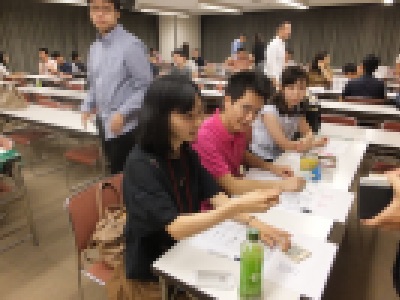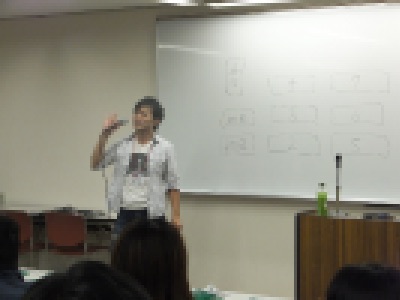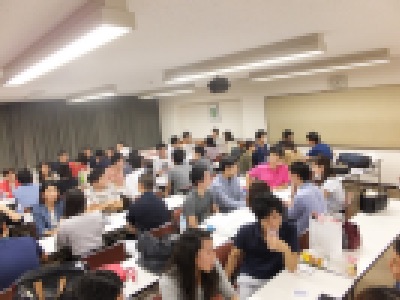1.受付の様子

2.前半マテリアルの紹介 Kさん

3.ディスカッション中の様子

:::::::::::::::::::::::::::::::::::::::::::::::::::::::::::::::::::::::::::::::
《 今回のworkshop 》
○workshop参加人数:66名(うち新人の方:5名)
○【前半】:Job interview
○【後半】:Halal Food
:::::::::::::::::::::::::::::::::::::::::::::::::::::::::::::::::::::::::::::::::
みなさまこんにちは、E’s club幹事のKです。
9月23日(土)開催の第158回workshopの詳細をお送りいたします。
今回は前半のマテリアルをKさん、後半のマテリアルをHさんにご作成いただきました。
前半は”Job interview”、後半は”Halal Food”というテーマでそれぞれディスカッションを行います。
[今週のマテリアル]
≪FIRST HALF≫
Divide your table into 2 groups. One is interviewers, the other is interviewees.
The interviewer asks the interviewee following questions. All of the interviewees have to answer. After answering from interviewee, interviewer can dig into the answer.
At 18:40, switch your roles and restart from Q1.
If you do not work, you can recall your work experience or school days for answering the questions.
Q1. What do you do?
Q2. Why did you choose your job or school?
Q3. Are you satisfied with current situations?
Q4. Why or Why not?(about Q3)
Q5. Have you ever changed your job or company or school?
Q6. Why?(For interviewee answered YES to Q5)
Q7. Why not?(For interviewee answered NO to both Q3 and Q5)
Q8. What is your strength and weakness?
Q9. What is your goal of your career?
Q10. Do you make an effort to achieve your goal?
Q11. What are you doing?(For interviewee answered YES to Q10)
Q12. What will you have done in 5 years and 10 years to achieve your goal?
≪LATTER HALF≫
<Agenda>
Halal Food
“Halal” means “legal / permitted items” in Arabic. Opposite word is “haram” which means “illegal or unpermitted”. Pork meal is all Haram for Muslims. Even chicken meal is haram unless it is slaughtered and transported in an appropriate way. Each country, including Japan, has own Halal certification organizations, but each organizations has different certification criteria. Japanese politics is separated with religion so that no ministry approves any halal-certification organizations.
<Reference>
1. https://www.thenational.ae/business/halal-food-certification-proving-a-problem-in-japan-1.145277
Tokyo // While Japanese producers strive to tap the growing local and international halal food sector, some operating within the country worry that the proliferation of certification bodies is a potential problem.
The lure is obvious – the Japan halal food market was estimated to be worth about US$200 million to £250m in 2015, says the senior food and beverage business analyst Arushi Thakur at the London-based market research company Technavio. “The major portion is imported from Malaysia,”she says.
The Japan government does not oversee halal certification and this exacerbates the problem for companies – and individuals – who want to be certain their certification will stand up to scrutiny, experts say.
Keigo Nakagawa, a researcher and consultant for the Tokyo-based Japan Halal Business Association (JHBA), with 152 member companies, says there are 22 halal certifying entities in Japan.
There are numerous bodies globally that identify what they say are authorised certification in Japan but, it seems, no one agrees on who these agencies are.
(Partially omitted)
“The limited facilities in halal certification in Japan and its dependency on imports may be a potential threat for the halal food market” in Japan, she says.
She says the lack of state oversight could undermine what is a growing opportunity for Japanese firms.
“The increasing availability of Japanese food across Muslim countries will provide a wider [export] opportunity for Japanese manufacturers, and a halal certificate from the Japanese government would be an advantage in entering the new market.”
But the problems for Japanese companies wanting to gain accepted – and trusted – halal certification at home will remain until the government takes steps to regulate the procedure.
As Mr Hakim says: “There are many more halal certifiers who issue certificates without properly auditing the food producing outlets and their products.
“These practices are affecting genuine halal food trade and obviously Muslim consumers are consuming products that are doubtful.”
2. http://toyokeizai.net/articles/-/43178 (in Japanese)
3. http://www.halalhmc.org/IndustryProblems.htm (This is about UK problem, but good for understanding)
PROBLEMS DISCOVERED IN THE ‘HALAL’ INDUSTRY
HMC exposes the corrupt practices found in the ‘Halal’ meat industry highlighting the potential dangers for Muslim consumers who freely buy meat and poultry from non certified sources and which necessitated the formation of HMC. What is even more worrying is that despite many slaughter – conditions being violated, the consumables are falsely labelled as ‘Halal’ and consumers are led to believe that they are genuinely Halal whereas in many cases the consumables would be Haram!
We can divide the industry into four areas:
1.Abattoirs & Slaughterhouses
2.Processing Plants
3.Outlets (Butchers, Restaurants, Takeaways etc)
4.Other Certifications
Abattoirs & Slaughterhouses
Many Muslims who originate from the Indian sub continent, Africa or Arab countries naively think that all meat and poultry is slaughtered in a simple manner which they saw practised in the countries they came from. What we have failed to realise is the demand for Halal meat and poultry has dramatically increased in the west and the companies supplying the meat and poultry have had to look for ways to increase the output. This has meant finding quicker ways of slaying the animals and at the same time keeping within the Halal laws. With this proving difficult, many slaughterhouses have looked for shortcuts in the Halal rules, many disregard the Halal slaughter prerequisites and many have no knowledge of the prerequisites whilst the main aim has become the increase of production and its returns. The corrupt and non-islamic practices prevalent within slaughterhouses supplying to the Halal market are as follows:
Place your cursor on the items below to read more on the issue
・Slaughtermen at abattoirs not reciting the Tasmiyah which is a condition for the animal to be Halal
・Taped Tasmiyyah
・Blessed Blades
・Non-Muslims slaughtering at various abattoirs, rendering the meat Haram
・Mechanical Slaughter/usage of rotating mechanical blades which does not serve to conduct a halal slaughter
・Minimum amount of required vessels not cut resulting in the animal being Haram
・Stunning animals prior to slaughter
・Dip tank water temperature over 60C for de-feathering causing the impurity to reach the flesh, which is Haram
・Imports and Mixing
・Contamination issue
Processing Plants
A large amount of meat and poultry slaughtered in the abattoirs is then passed on to the processing plants. The processing plants can range from processing, cutting, de-boning to preparing ready made meals and preparing frozen packed or canned consumables. In our experience many of the processing plants are not very particular in verifying the methods of slaughter and are accommodating any meat or poultry which is labelled Halal whether from the U.K or abroad. This is leading to problems similar to those at the abattoirs where verification of the halalness of the products is very difficult. In fact, although sometimes the processing plants may be unaware of the source, some are deliberately sourcing from Haram. The other issue is anonymous meat and poultry imported from around the world labelled Halal is entering the market without the importers even knowing what slaughter methods are being used. Many of these when scrutinized and checked do not even come close to being Halal.
Outlets (Butchers, Restaurants, Takeaways etc)
The butchers and outlets receiving the meat and poultry from the abattoirs and processing plants are just as negligent in verifying their sourcing as the rest of the chain above. Many of them are genuinely unaware of the problematic industry and they would merely place the trust in and take the word of the supplier just because it is claimed to be Halal.
Other Certifications and their Flaws
The only way to help Muslim consumers make an informed choice and help them consume genuine Halal meat and poultry was to introduce a certification system which covers all the chain from source to outlet. There have been quite a few attempts in the past and currently to certify this problematic industry. The sad thing is that some of the systems put in place by a number of certifying bodies are very weak and have only increased the problem. Some organisations issue Halal certificates for life, others issue Halal certificates over the phone, other abattoirs are inspected once a year and issued a Halal certificate, and other certifiers do not even have knowledge of what are the correct standards for Halal. Sadly, stunned and mechanically slaughtered meat and poultry is also being certified by various bodies in the UK.
THE MOST ABUSED WORD ‘HALAL’!
The above problems highlighted lead to the biggest dilemma of all, Muslim consumers buying meat, poultry, kebabs, samosas or anything else labelled as Halal from butchers, takeaways, or restaurants are not and can not be certain about the genuineness and authenticity of the Halal label, either through ignorance in the chain of suppliers or either through unscrupulous, deceitful, corrupt and greedy meat traders.
In conclusion, the word Halal has become the most abused word equally misused by Muslims and non Muslims. The word ‘Halal’ is displayed anywhere and everywhere without any kind of regulation and corroboration and the consumers are made to believe that it is genuinely Halal.
The questions we leave you with are:
・How confident are you about the Halal status of the meat and poultry you are consuming today?
・How sure are you that the meat and poultry you are buying today is not slaughtered in the above mentioned methods?
・Is the word Halal displayed sufficient for you, or do you require some kind of assurance?
・Make an informed choice! Refuse to be conned in Haram in the name of Halal.
Let’s clean up the Halal industry!
This state of affairs urgently dictated that a committee be setup which monitored every phase of the processing of meat and poultry to ensure their suitability for the Muslim market.
<Questions>
Q1. Have you ever been aware of your religion? (If you are with no religious faith, have you ever been aware of your irreligion?) Under what circumstances did you feel so?
Q2. Is current Japanese certification system reliable? If not, what is the cause?
Q3. What is the cause of global halal certification problem?
Q4. How will this unreliable authentication affect Muslims, company (which wants formal certification), company (which wants simplified certification), country and certification organizations?
Q5. How should Japanese government act in the future?
Q6. As this Muslim matter, how should we take care of Hindus? How about vegetarian?
***********************************************************
私たちと一緒に英語コミュニケーション能力を鍛えませんか?
ご興味を持たれた方は、
入会申込フォーム
https://english-speaking-club.com/cms/?page_id=93
よりお申し込みください。お待ちしています!
***********************************************************